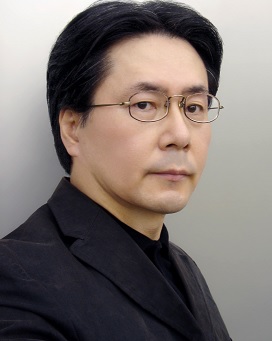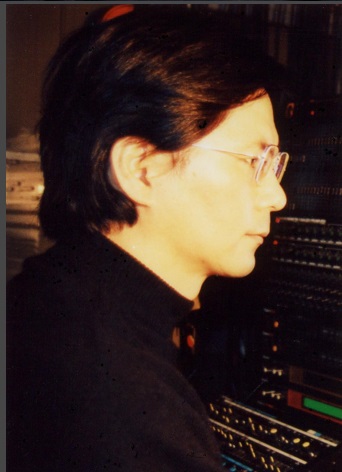|
****************************
|
Yasuhiro Takenaka, a native of Hiroshima. After completing his music studies, in addition to composing
instrumental works including symphonic and chamber music for various types of ensembles, he has also
been involved with electroacoustic music, but is mainly self-taught. Work as visiting scholar at the
Center for Computer Research in Music and Acoustics (CCRMA) of Stanford University (1998). He has
received the Second Prize (no First Prize awarded) at the 5th International Composition Competition
“Prof. Ivan Spassov” in Plovdiv-Bulgaria (2010) for his violin concerto “Hierophany” and the
Electronic/Computer Composition Award at the International New Music Consortium Composition
Competition in New York (2000) for his electroacoustic music “Kagula”; besides, his music has been
recognized by a number of International Electroacoustic or Computer Music Competitions: Honorary
Mention at the MUSICANOVA in Czech Republic (2003), Honorable Mention at the NEWCOMP in
USA (1990), Mention at the Bourges in France (1988/91).
Takenaka's works have been performed throughout Europe, North and South America, Oceania, as well
as the Far East in the frame of radio programs, of concerts and festivals. Major contemporary music and
electronic festivals which have included performances of his works are the Tongyeong International
Music Festival in South Korea (2009), the 3rd International Electro-Acoustic Music Meeting in Brazil
(2003), the ISCM World Music Days in Romania (1999), the Warsaw Autumn in Poland (1994), the
Bourges Festival “Synthèse” in France (1992/95/2000/2003), the International Computer Music
Conferences (1992/96/97/2003/2005), the Asia-Pacific Festival & Composers’ Conference in New
Zealand (1992), the Asian Composers League Conferences & Festivals (1991/93/95/2009/2011), the
Musica Verticale in Italy (1991) and others.
OPUS DISSONUS - What was your first contact with the art of composing?
TAKENAKA - I remember I started composing when I was around 13. It was absolutely self-taught composing. I later studied harmony, counterpoint, fugue and sonata forms, but not once were they helpful for composing.
Maybe there is no relation between learning and creating. I think accumulating experience through trial and error or devising is more important for a mastery of composing.
OPUS DISSONUS - What motivated you to start?
TAKENAKA - I think anyone who is creative would answer the same if asked about why they started: because they discovered joy. That’s my answer too.
There are four necessary elements of creation:
1) Inspiration and genius
2) To love it, to connect the act of creating with joy
3) Motivation and perseverance
4) The surrounding environment
OPUS DISSONUS - How does your compositional process work?
TAKENAKA - About 30 years ago, I began composing using a computer.
At first, it was to realize electronic music, but now, I also simulate and compose instrumental music on the computer.
The benefits of composing on the computer are as follows:
1) You can directly reflect your inspirations and thoughts.
2) You can objectively grasp how your piece sounds.
3) You can record and compare multiple takes.
4) By freely editing the details and the whole, you can enhance the completeness of your piece.
OPUS DISSONUS - Who are the composers who have had the greatest influence on your work, from the earliest
TAKENAKA - compositions to the present?
When I began composing, I was listening to music by various composers, including the Beatles and rock music that had become fashionable at the time, but I never made music that was committed to a certain person’s style, such as a piece in the style of Debussy or Stravinsky.
OPUS DISSONUS - In your opinion, what can we expect for the future of classical music?
TAKENAKA - Music is something that nestles in people’s hearts. It is also something that flows like a river. No one can stop that flow. But there is nothing to worry about. New music will be born again in the next generation and nestle in people’s hearts.
You can ask, “What is music?” But that would be similar to asking, “What is human?” Music and dance are fundamentally connected to people, and depending on how a person feels at that moment, that state of connection takes a variety of forms. When tastes change and interest fades, we grow tired of something and stop paying attention to it. But we also have the flexibility to create something new. As a result, we produce something we never previously imagined, and it becomes an aspect of an era that is completely different from anything that preceded it.
Currently, classical music is like a left-behind oxbow lake that carries an enormous historical legacy. The mainstream has already flowed in a different direction. Rock, pop music, and electronic dance music, among others, are successively creating new streams and vigorously running through the modern generation. Looking ahead in the long term, I’d say that music will continue to change.
Regarding the future of classical music, I can only say that you won’t know it until you are there to see it.
This is because no matter how much we hope for something, the future lies in the hands of people who live in the future. However, there is something we can do. For example, it would be great if there were new classical music pieces that resonated in the hearts of people today. At any rate, if it does not continue to flow, it will not connect with the next generation.
OPUS DISSONUS - Final words/considerations, or your words for the composers of the future.
TAKENAKA - That which is essential for your soul will become what you compose. It’s like making true friends. Even if you are always separated, when you are lost, they will be there to cuddle you. When you are sad, they will be sad with you. When you are suffering, they will share your suffering.
When you need encouragement, they will inspire you. When you have lost your way, they will continue to walk with you through darkness to any place. If you can compose this kind of music, then people will gather around and listen.
I have no smugness. A critic once said, “No work of art can escape from the market principle.” This is the same as saying that a piece does not exist if many people do not listen to it.
So how do we begin? You should understand joy. Find joy. Joy will lead you in the right direction. If you can follow that path, the road will be open. No matter how lonely an artist is, he has no other road to follow but his own. The only friend who will follow that road with him will be the piece he composes.
|
****************************
|



